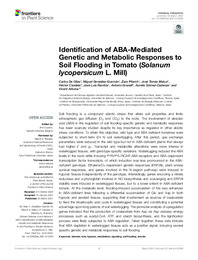Por favor, use este identificador para citar o enlazar este ítem:
https://hdl.handle.net/11000/35310Registro completo de metadatos
| Campo DC | Valor | Lengua/Idioma |
|---|---|---|
| dc.contributor.author | de Ollas, Carlos | - |
| dc.contributor.author | Gonzalez-Guzman, Miguel | - |
| dc.contributor.author | Pitarch, Zara | - |
| dc.contributor.author | Matus, José Tomás | - |
| dc.contributor.author | Candela, Héctor | - |
| dc.contributor.author | Rambla, José L. | - |
| dc.contributor.author | Granell, Antonio | - |
| dc.contributor.author | Gomez-Cadenas, Aurelio | - |
| dc.contributor.author | Arbona, Vicent | - |
| dc.contributor.other | Departamentos de la UMH::Biología Aplicada | es_ES |
| dc.date.accessioned | 2025-01-26T10:35:31Z | - |
| dc.date.available | 2025-01-26T10:35:31Z | - |
| dc.date.created | 2021-03-05 | - |
| dc.identifier.citation | Frontiers in Plant Science, 05 March 2021, Sec. Plant Abiotic Stress, Volume 12 - 2021 | es_ES |
| dc.identifier.issn | 1664-462X | - |
| dc.identifier.uri | https://hdl.handle.net/11000/35310 | - |
| dc.description.abstract | Soil flooding is a compound abiotic stress that alters soil properties and limits atmospheric gas diffusion (O2 and CO2) to the roots. The involvement of abscisic acid (ABA) in the regulation of soil flooding-specific genetic and metabolic responses has been scarcely studied despite its key importance as regulator in other abiotic stress conditions. To attain this objective, wild type and ABA-deficient tomatoes were subjected to short-term (24 h) soil waterlogging. After this period, gas exchange parameters were reduced in the wild type but not in ABA-deficient plants that always had higher E and gs. Transcript and metabolite alterations were more intense in waterlogged tissues, with genotype-specific variations. Waterlogging reduced the ABA levels in the roots while inducing PYR/PYL/RCAR ABA receptors and ABA-dependent transcription factor transcripts, of which induction was less pronounced in the ABAdeficient genotype. Ethylene/O2-dependent genetic responses (ERFVIIs, plant anoxia survival responses, and genes involved in the N-degron pathway) were induced in hypoxic tissues independently of the genotype. Interestingly, genes encoding a nitrate reductase and a phytoglobin involved in NO biosynthesis and scavenging and ERFVII stability were induced in waterlogged tissues, but to a lower extent in ABA-deficient tomato. At the metabolic level, flooding-induced accumulation of Ala was enhanced in ABA-deficient lines following a differential accumulation of Glu and Asp in both hypoxic and aerated tissues, supporting their involvement as sources of oxalacetate to feed the tricarboxylic acid cycle in waterlogged tissues and constituting a potential advantage upon long periods of soil waterlogging. The promoter analysis of upregulated genes indicated that the production of oxalacetate from Asp via Asp oxidase, energy processes such as acetyl-CoA, ATP, and starch biosynthesis, and the lignification process were likely subjected to ABA regulation. Taken together, these data indicate that ABA depletion in waterlogged tissues acts as a positive signal, inducing several specific genetic and metabolic responses to soil flooding. | es_ES |
| dc.format | application/pdf | es_ES |
| dc.format.extent | 20 | es_ES |
| dc.language.iso | eng | es_ES |
| dc.publisher | Frontiers Media | es_ES |
| dc.rights | info:eu-repo/semantics/openAccess | es_ES |
| dc.rights | Attribution-NonCommercial-NoDerivatives 4.0 Internacional | * |
| dc.rights.uri | http://creativecommons.org/licenses/by-nc-nd/4.0/ | * |
| dc.subject | abscisic acid | es_ES |
| dc.subject | hypoxia | es_ES |
| dc.subject | metabolism | es_ES |
| dc.subject | signaling | es_ES |
| dc.subject | soil flooding | es_ES |
| dc.subject | tomato | es_ES |
| dc.subject.other | CDU::5 - Ciencias puras y naturales::57 - Biología | es_ES |
| dc.title | Identification of ABA-Mediated Genetic and Metabolic Responses to Soil Flooding in Tomato (Solanum lycopersicum L. Mill) | es_ES |
| dc.type | info:eu-repo/semantics/article | es_ES |
| dc.relation.publisherversion | https://doi.org/10.3389/fpls.2021.613059 | es_ES |

Ver/Abrir:
fpls-12-613059 (1).pdf
3,59 MB
Adobe PDF
Compartir:
 La licencia se describe como: Atribución-NonComercial-NoDerivada 4.0 Internacional.
La licencia se describe como: Atribución-NonComercial-NoDerivada 4.0 Internacional.
.png)